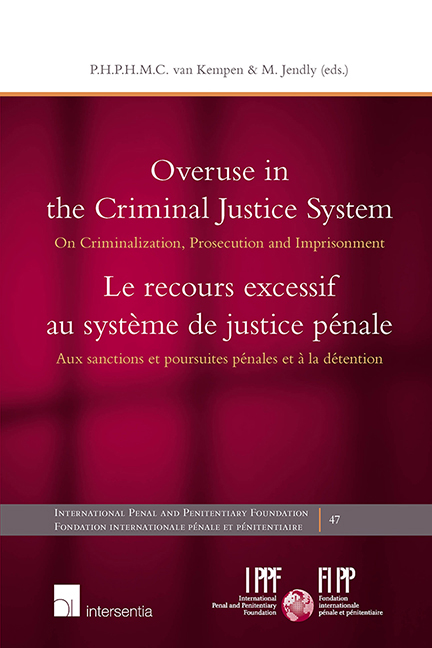Book contents
- Frontmatter
- Dedication
- Contents
- Acknowledgements
- Remerciements
- PART I INTRODUCTORY SYNTHESIS AND ANALYSES 1ÈRE PARTIE. SYNTHÈSE ET ANALYSES INTRODUCTIVES
- PART II THEMES 2ÈME PARTIE. THÈMES
- PART III NATIONAL REPORTS 3ÈME PARTIE. RAPPORTS NATIONAUX
- Overuse in the Criminal Justice System in Argentina
- Le recours au système de justice pénale en Belgique: état des lieux et perspectives
- Overuse of Criminal Law in Finland
- Overuse in the Criminal Justice System in Germany
- Overuse in the Criminal Justice System in Greece
- Overusing the Criminal Justice System: the Case of Ireland
- Overuse in the Criminal Justice System in Japan
- Tendencies of Overuse in Criminal Law Policy and Criminal Law Enforcement in the Netherlands
- Overuse in the Criminal Justice System in New Zealand
- Overuse in the Criminal Justice System in Nigeria
- Overuse in the Criminal Justice System in Poland
- Overuse in the Russian Criminal Justice System
- Overuse in the Criminal Justice System in Spain
- Recourt-on de manière excessive au système pénal en Suisse?
- Overuse of the Criminal Justice System in Taiwan
- Overuse and Underuse of the United States Criminal Justice System in the Area of Business Crimes
- The International Penal and Penitentiary Foundation: history and purpose
- La Fondation internationale pénale et pénitentiaire: histoire et objectif
- The IPPF Series
Overuse in the Criminal Justice System in Nigeria
from PART III - NATIONAL REPORTS 3ÈME PARTIE. RAPPORTS NATIONAUX
Published online by Cambridge University Press: 26 June 2019
- Frontmatter
- Dedication
- Contents
- Acknowledgements
- Remerciements
- PART I INTRODUCTORY SYNTHESIS AND ANALYSES 1ÈRE PARTIE. SYNTHÈSE ET ANALYSES INTRODUCTIVES
- PART II THEMES 2ÈME PARTIE. THÈMES
- PART III NATIONAL REPORTS 3ÈME PARTIE. RAPPORTS NATIONAUX
- Overuse in the Criminal Justice System in Argentina
- Le recours au système de justice pénale en Belgique: état des lieux et perspectives
- Overuse of Criminal Law in Finland
- Overuse in the Criminal Justice System in Germany
- Overuse in the Criminal Justice System in Greece
- Overusing the Criminal Justice System: the Case of Ireland
- Overuse in the Criminal Justice System in Japan
- Tendencies of Overuse in Criminal Law Policy and Criminal Law Enforcement in the Netherlands
- Overuse in the Criminal Justice System in New Zealand
- Overuse in the Criminal Justice System in Nigeria
- Overuse in the Criminal Justice System in Poland
- Overuse in the Russian Criminal Justice System
- Overuse in the Criminal Justice System in Spain
- Recourt-on de manière excessive au système pénal en Suisse?
- Overuse of the Criminal Justice System in Taiwan
- Overuse and Underuse of the United States Criminal Justice System in the Area of Business Crimes
- The International Penal and Penitentiary Foundation: history and purpose
- La Fondation internationale pénale et pénitentiaire: histoire et objectif
- The IPPF Series
Summary
INTRODUCTION
In Nigeria, the criminal justice system is predicated on the notions that the suspect's, accused or defendant's dignity must be recognized and that generally the suspect or defendant/accused is considered innocent until proven guilty by a court of competent jurisdiction. Unfortunately, violations of these fundamental procedural rules have become rampant in Nigeria. Such violations obviously obstruct defendant's human rights and most essentially threaten the very foundation of the Nigeria criminal justice system.
The prison population in Nigeria has therefore been described as a mixed grill consisting of adult males and females, young persons, criminal and civil lunatics, pregnant women, debtors, detainees and first offenders. About 70% of the people admitted to prison are awaiting trial or are being remanded in custody. Nigeria currently has a total of 241 prisons. In some of these prisons, the percentage of persons awaiting trial is as high as 80 to 97% of the total prison population. The majority of these awaiting trial persons (ATPs) end up waiting months or even years before their trial starts and consequently fall victim of what has been termed the human rights crisis of our time: the overuse of pre-trial detention.
Many of these ATPs do not need to be there, but are held on charges linked to minor, nonviolent offenses. Others should have been tried, or released: people like Hyginus Ajibo, a Nigerian who was accused of murder and spent almost 17 years in pre-trial detention until he was released on bail in 2014. Not surprisingly, it is the poor who make up the vast majority of those held in pre-trial. The poor are more likely to come into conflict with the law, more likely to be detained pending trial, and less able to afford the keys to pre-trial release: a bribe, bail, or a lawyer.
Factors identified as resulting in the high percentage of ATPs and elongating their stay awaiting trial include delays in the administration of justice, overuse of prison sentences, over criminalization and inadequate utilization of both police and court bail. However, not all detention is irrational or unlawful. Persons who present a genuine risk of flight or are likely to endanger witnesses or the community can be detained before trial, in the absence of reasonable alternatives. Pre-trial detention when applied properly and sparingly plays an important role in a balanced criminal justice system.
- Type
- Chapter
- Information
- Overuse in the Criminal Justice SystemOn Criminalization, Prosecution and Imprisonment, pp. 481 - 508Publisher: IntersentiaPrint publication year: 2019



